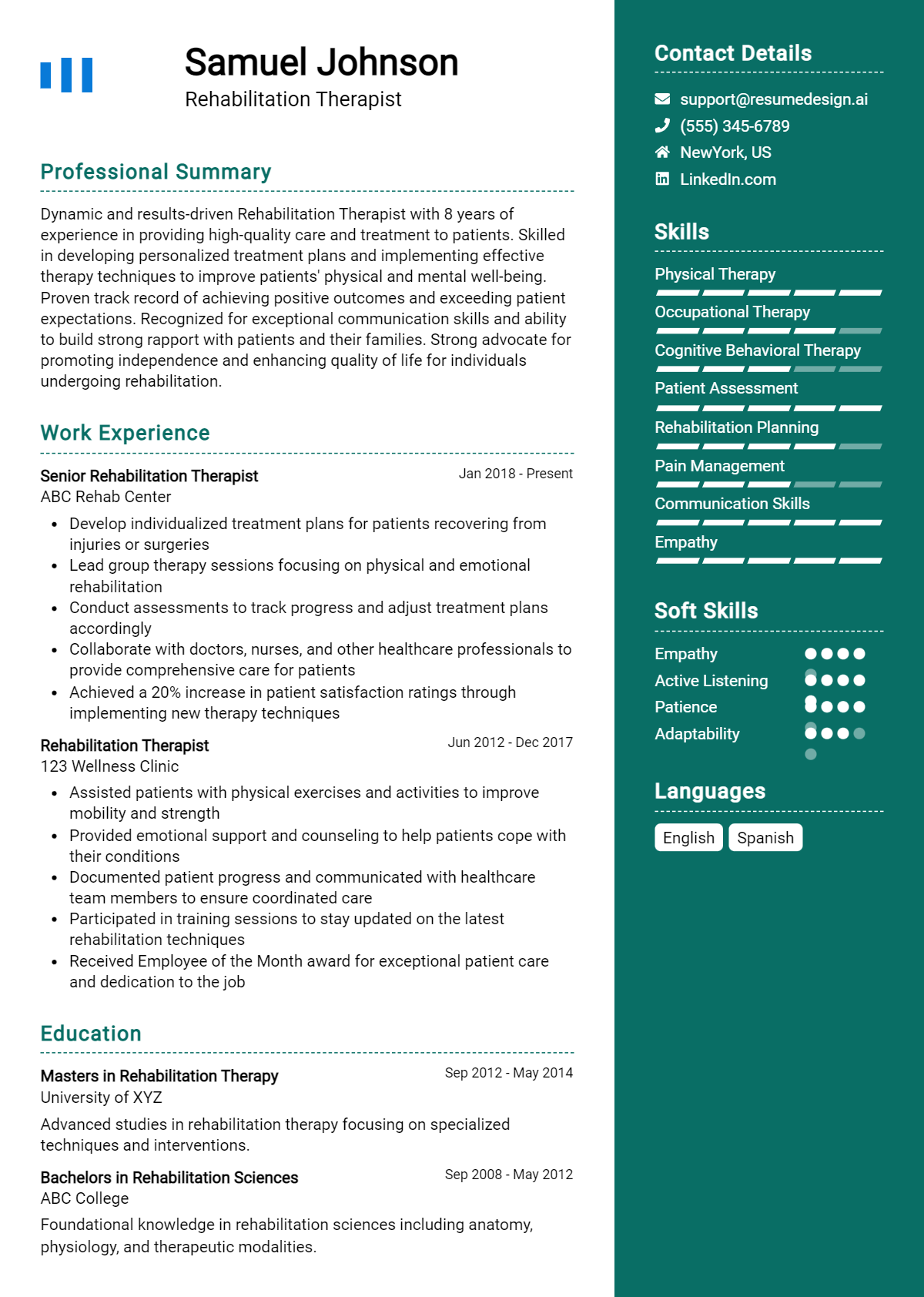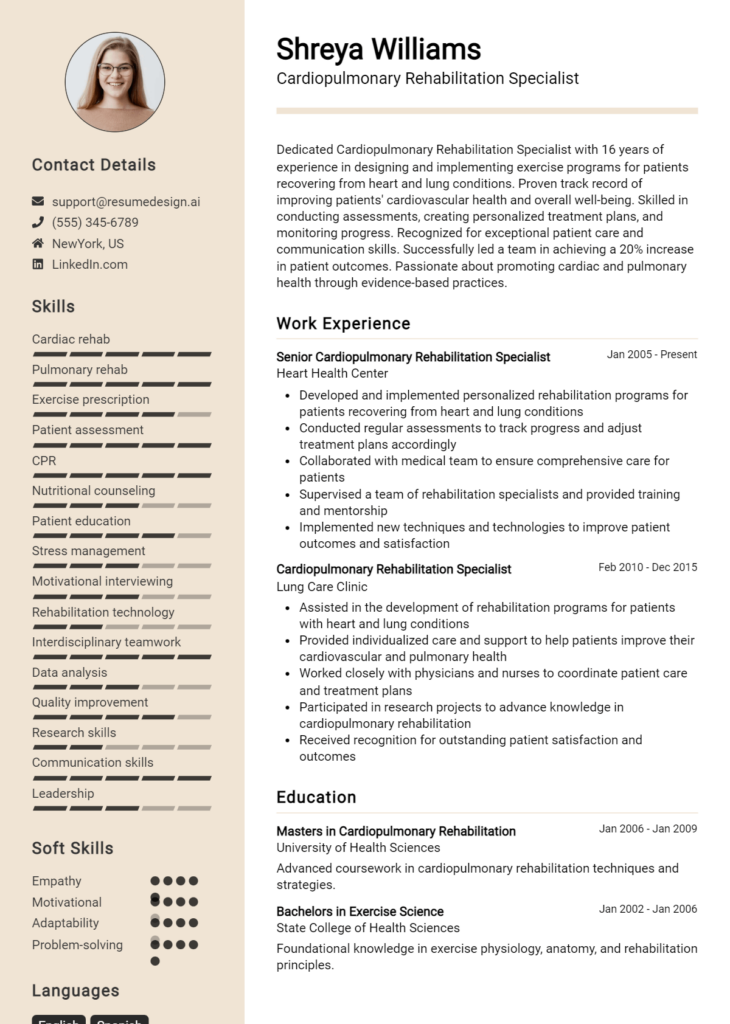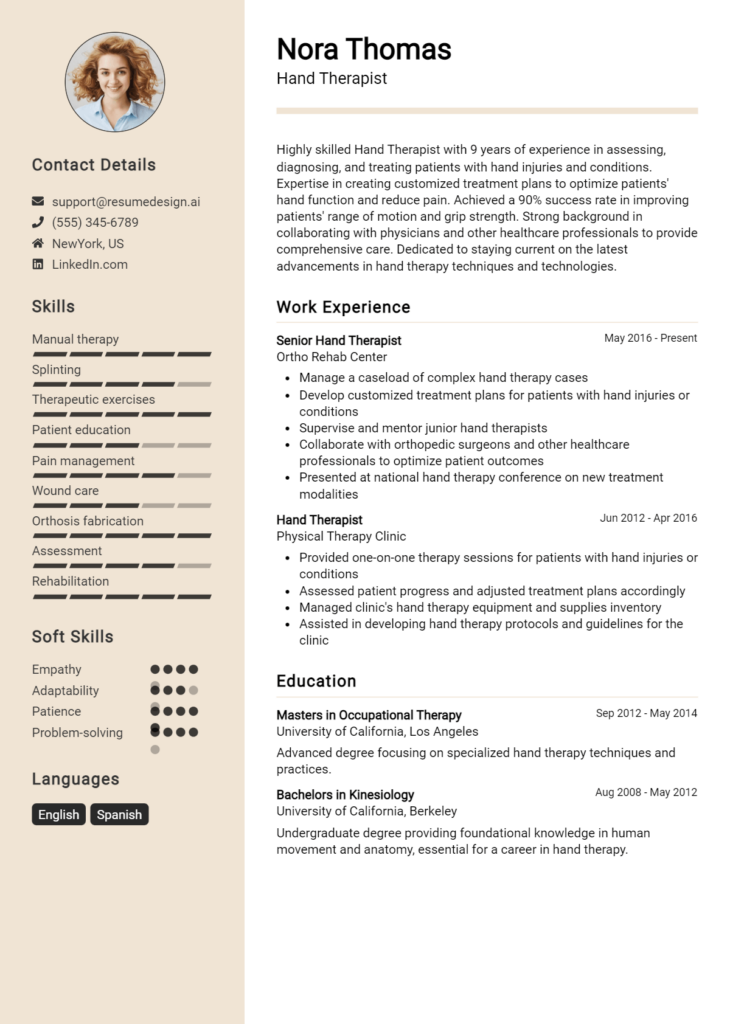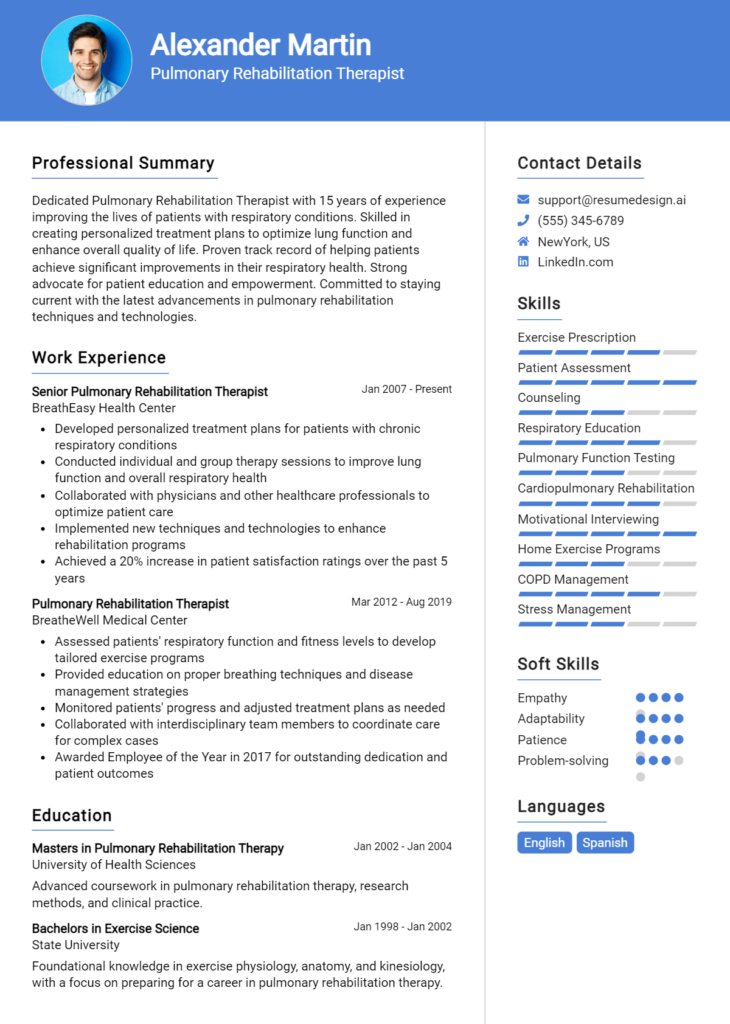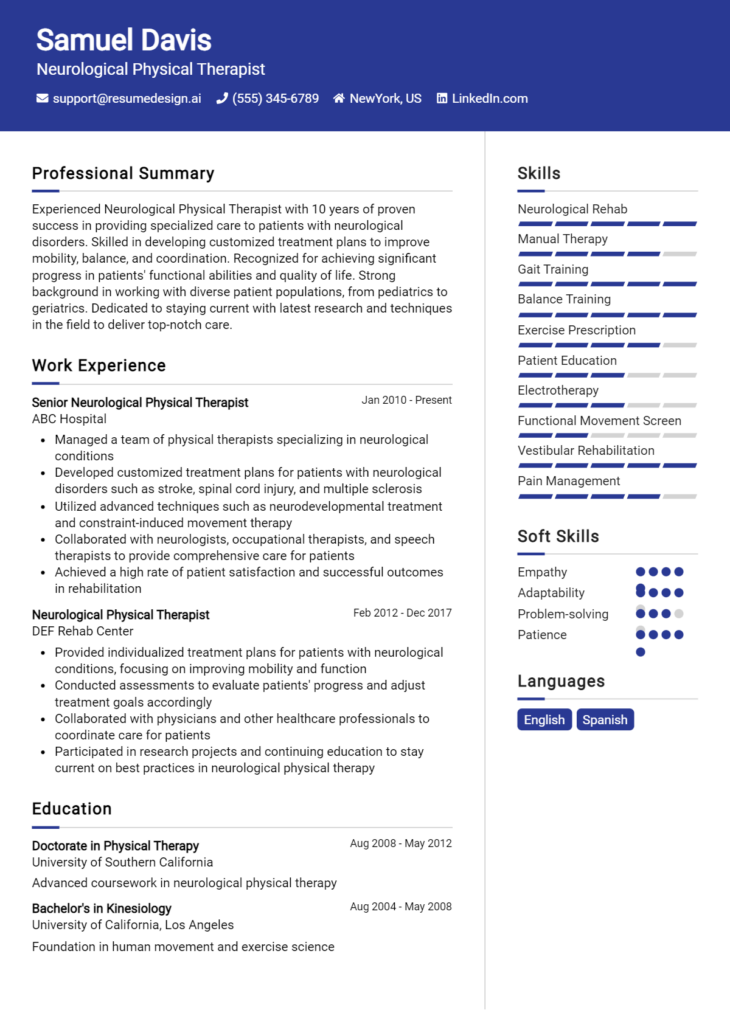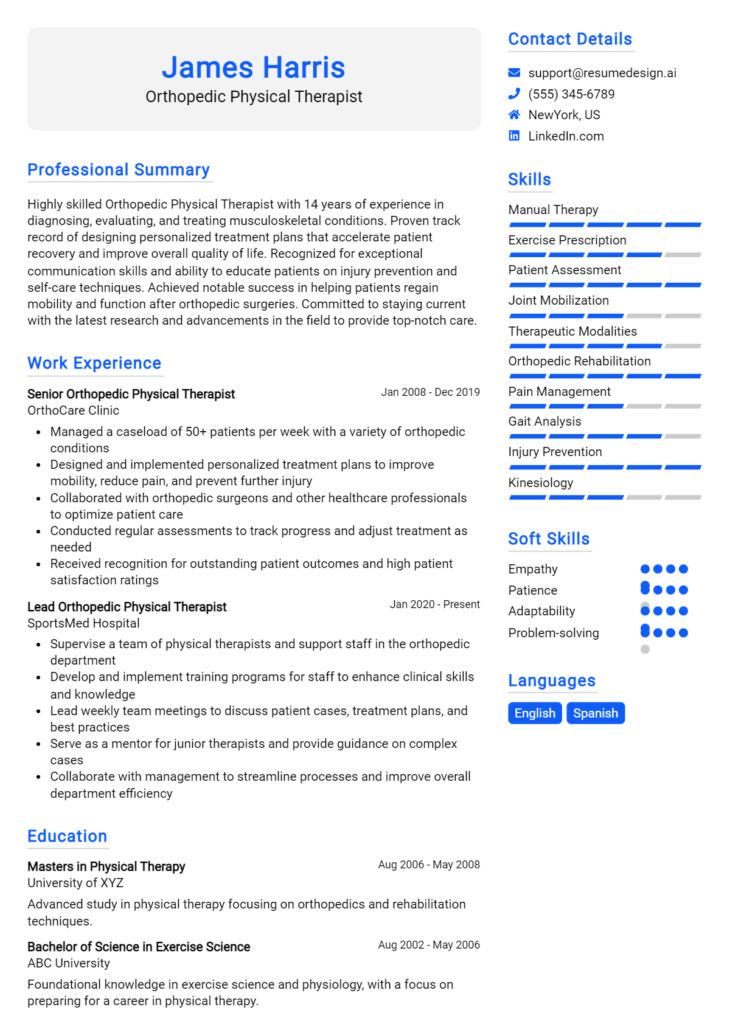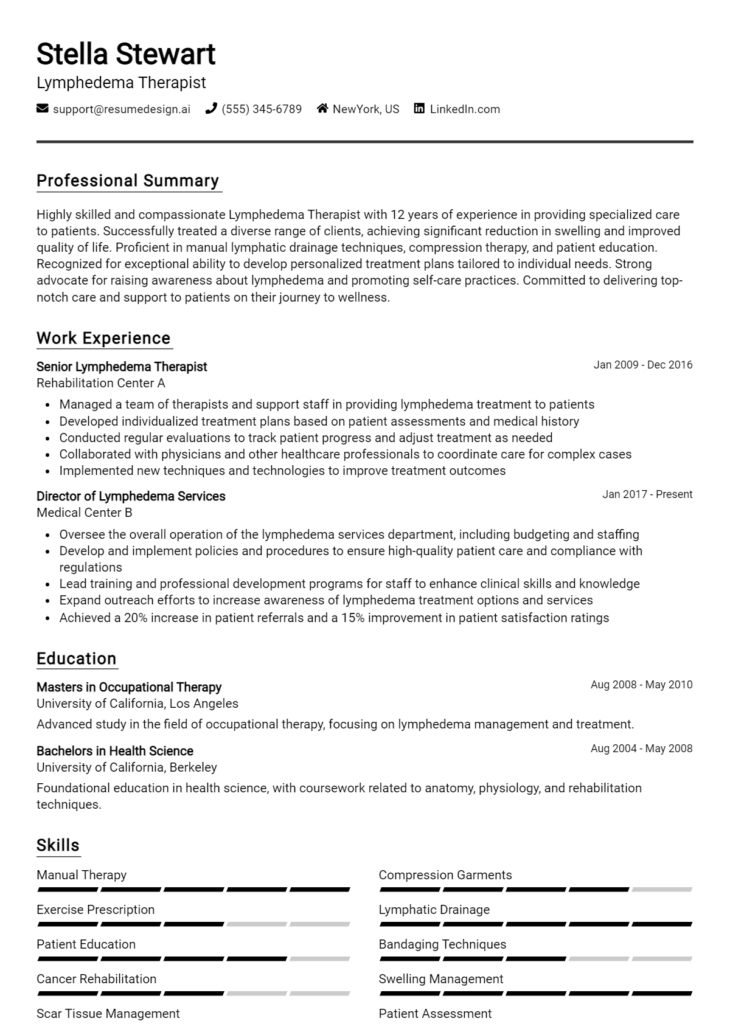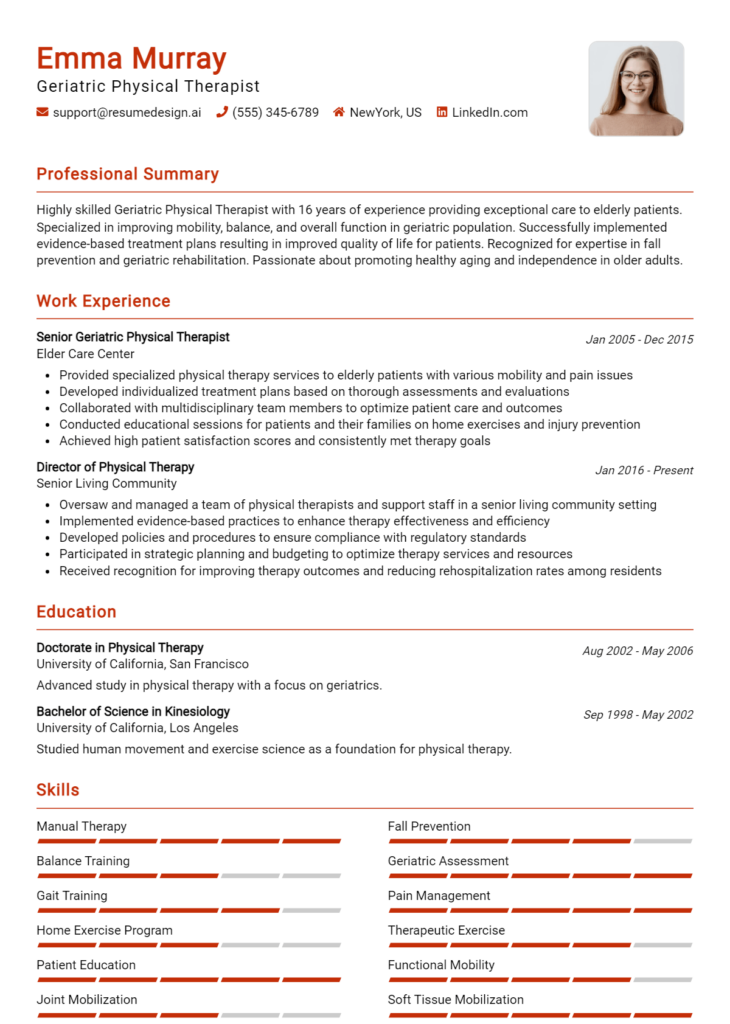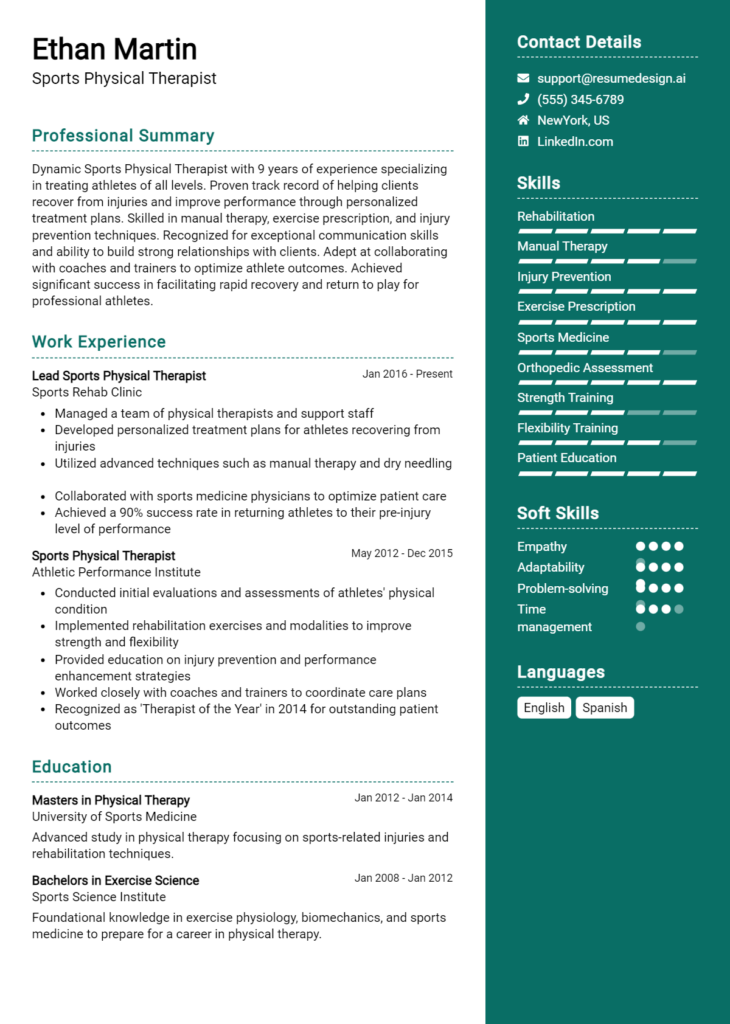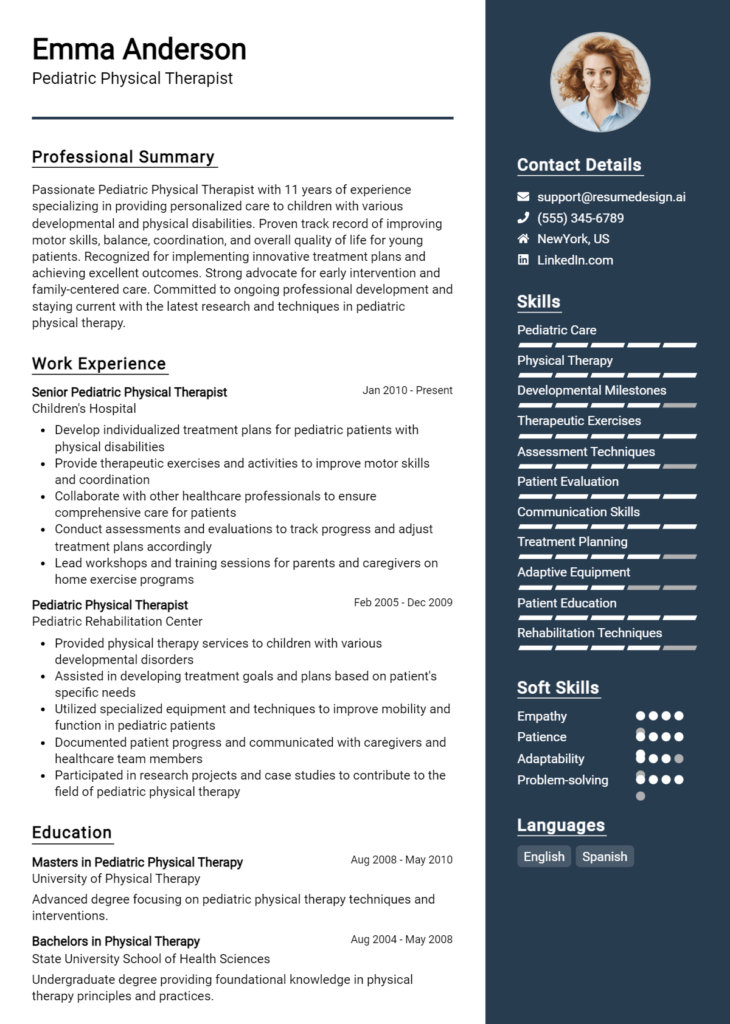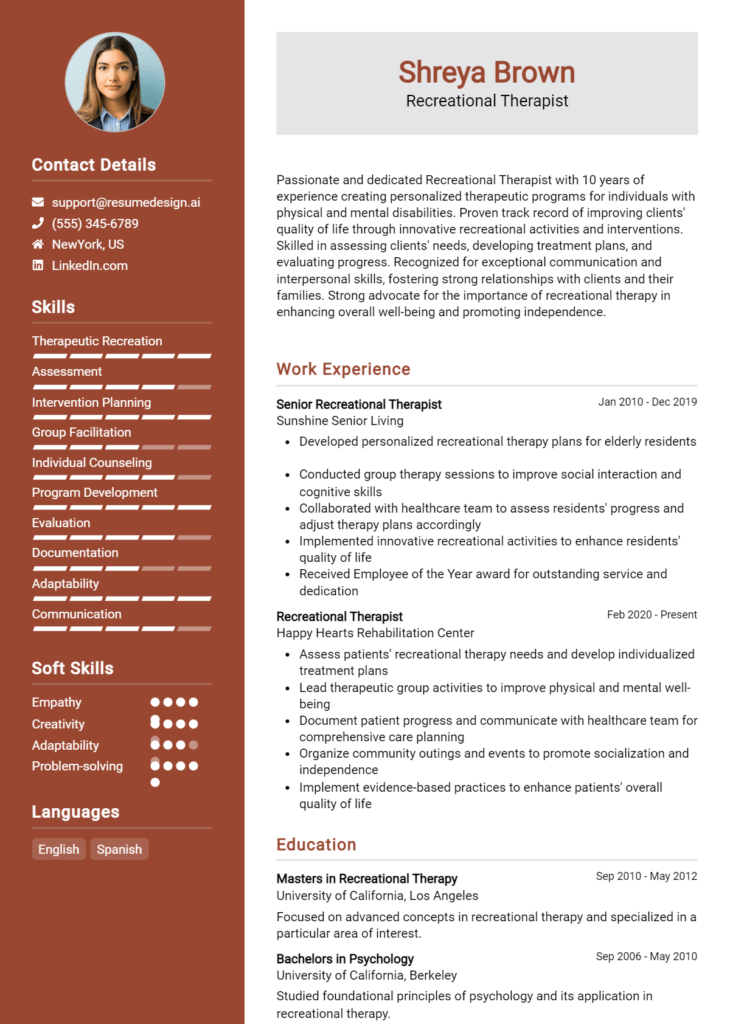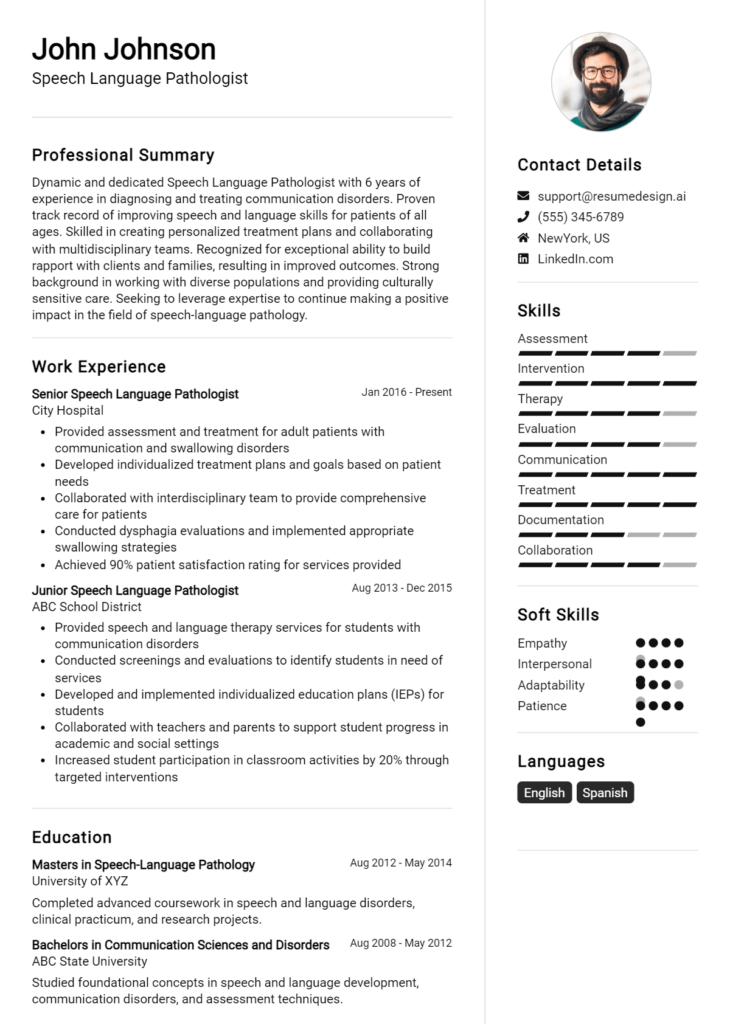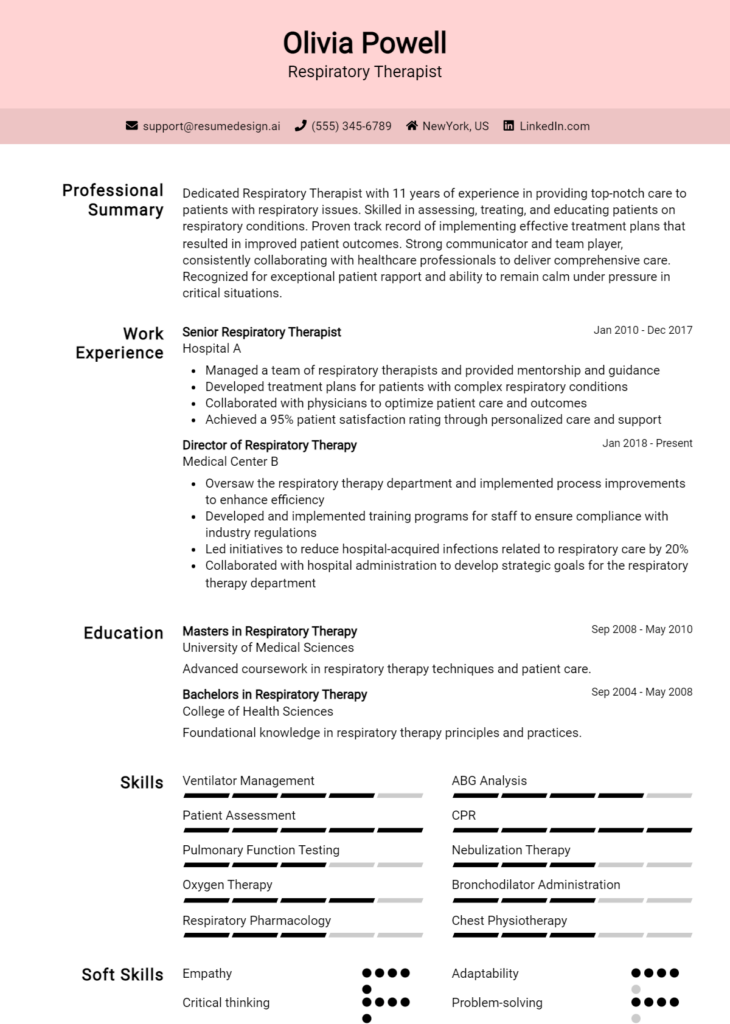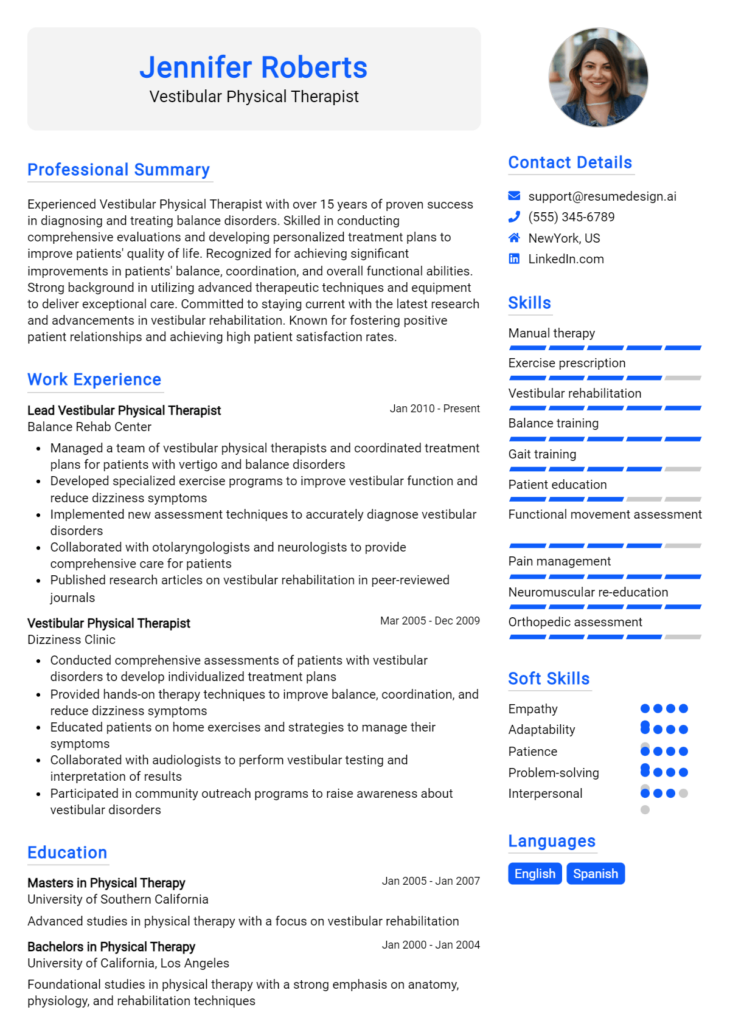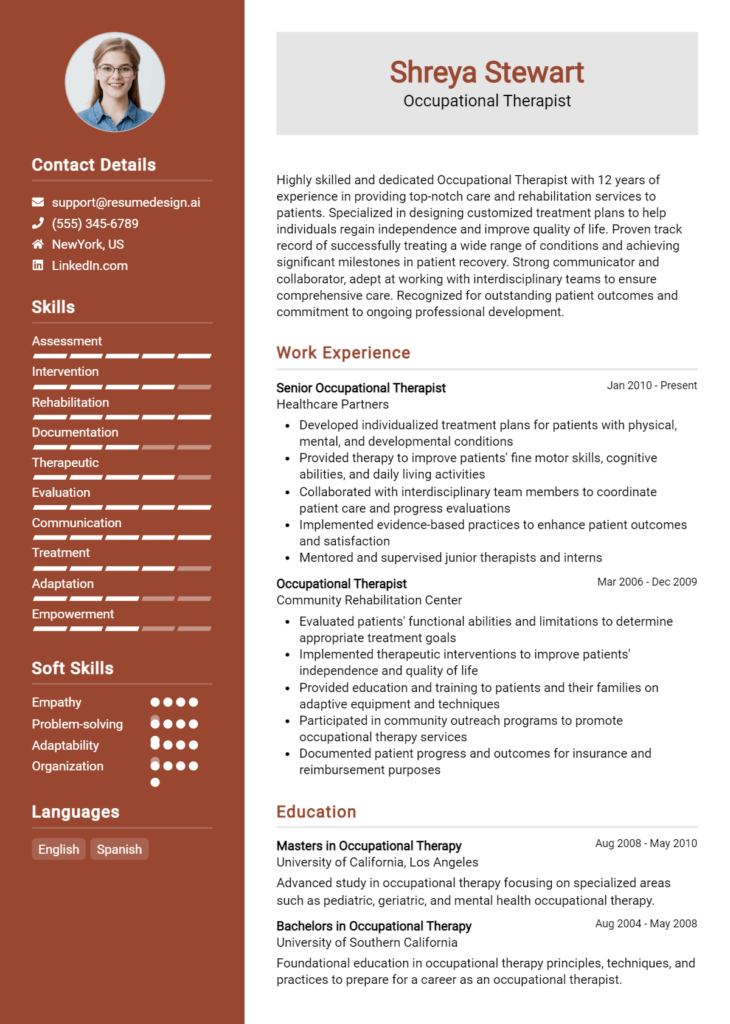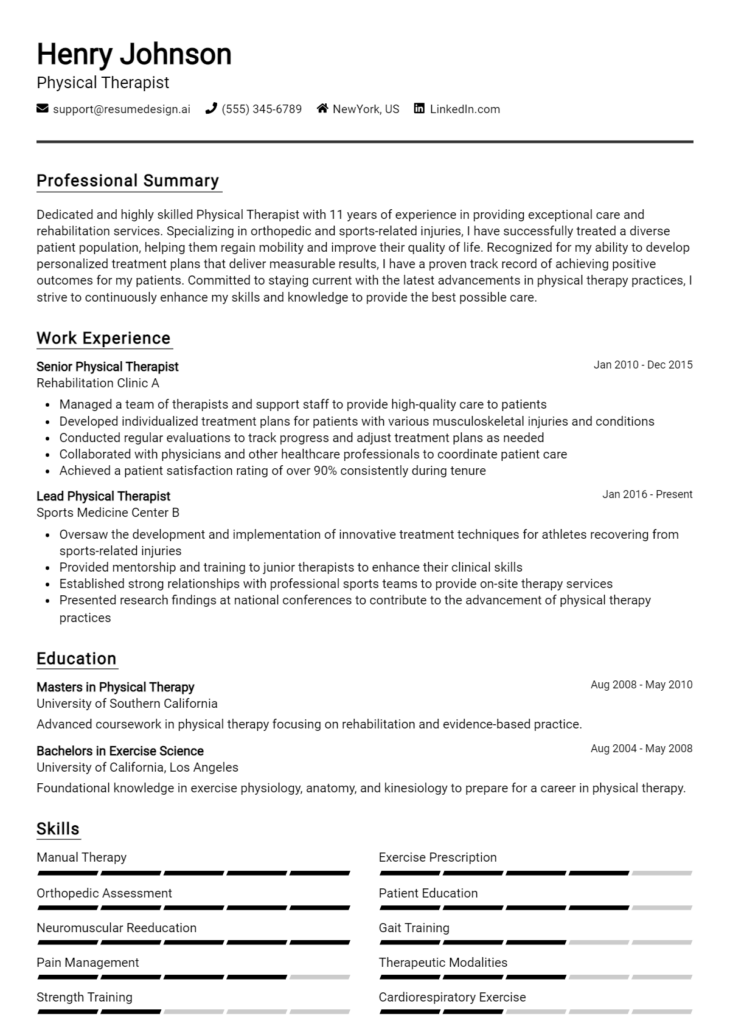Rehabilitation Therapist Core Responsibilities
A Rehabilitation Therapist plays a crucial role in enhancing patients' recovery and quality of life through specialized care. Key responsibilities include assessing patient needs, developing tailored rehabilitation plans, and collaborating with multidisciplinary teams such as physicians, nurses, and occupational therapists. Essential skills encompass technical proficiency in therapeutic techniques, operational awareness of treatment protocols, and strong problem-solving abilities to address diverse patient challenges. These competencies are vital for achieving organizational goals, and a well-structured resume can effectively highlight these qualifications.
Common Responsibilities Listed on Rehabilitation Therapist Resume
- Conducting comprehensive assessments of patient conditions and needs.
- Developing individualized rehabilitation treatment plans.
- Implementing therapeutic exercises and activities.
- Monitoring patient progress and adjusting treatment plans as necessary.
- Collaborating with healthcare professionals across various departments.
- Educating patients and families on rehabilitation processes and techniques.
- Documenting patient progress and maintaining accurate records.
- Providing emotional support and motivation to patients.
- Staying updated on industry best practices and advancements.
- Participating in team meetings to discuss patient care strategies.
- Adhering to safety and compliance regulations in rehabilitation practices.
- Utilizing assistive technology and equipment effectively.
High-Level Resume Tips for Rehabilitation Therapist Professionals
A well-crafted resume is essential for Rehabilitation Therapist professionals, as it often serves as the first impression a candidate makes on potential employers. In a competitive job market, your resume must effectively reflect your unique skills, qualifications, and achievements to stand out. It should not only highlight your clinical expertise but also capture the essence of your contributions to patient care and rehabilitation outcomes. This guide will provide practical and actionable resume tips specifically tailored for Rehabilitation Therapist professionals, enabling you to present your credentials in the best possible light.
Top Resume Tips for Rehabilitation Therapist Professionals
- Tailor your resume to each job description by incorporating relevant keywords and phrases that reflect the specific requirements of the position.
- Showcase your relevant experience by detailing your roles in various rehabilitation settings, including specific populations you have worked with (e.g., pediatrics, geriatrics).
- Quantify your achievements with measurable outcomes, such as percentage improvements in patient recovery times or successful interventions.
- Highlight industry-specific skills, such as familiarity with rehabilitation technologies, assessment tools, and therapeutic techniques.
- Include certifications and licenses that are pertinent to the role, ensuring they are prominently displayed in your credentials section.
- Incorporate a professional summary at the top of your resume that succinctly captures your career highlights and professional philosophy.
- Utilize action verbs to describe your responsibilities and accomplishments, which can help convey a sense of proactivity and impact.
- Keep your resume concise and focused, ideally one page for less experienced professionals and no more than two pages for those with extensive experience.
- Proofread your resume meticulously to eliminate any spelling or grammatical errors, as these can detract from your professionalism.
- Consider including continuing education and professional development courses to demonstrate your commitment to staying current in the field.
By implementing these resume tips, Rehabilitation Therapist professionals can significantly enhance their chances of landing a job in this rewarding field. A well-structured and focused resume not only showcases your qualifications but also communicates your dedication to improving patient outcomes, making you a more appealing candidate to potential employers.
Why Resume Headlines & Titles are Important for Rehabilitation Therapist
In the competitive field of rehabilitation therapy, the importance of a strong resume headline cannot be overstated. A well-crafted headline serves as the first impression for hiring managers, capturing their attention and summarizing a candidate's key qualifications in one impactful phrase. It acts as a succinct introduction that can set the tone for the entire resume, making it crucial to ensure that the headline is concise, relevant, and directly related to the specific job being applied for. An effective resume headline not only showcases the candidate's professional identity but also highlights their unique strengths, paving the way for a deeper exploration of their qualifications.
Best Practices for Crafting Resume Headlines for Rehabilitation Therapist
- Keep it concise: Aim for one to two impactful phrases.
- Be role-specific: Tailor the headline to the rehabilitation therapist position you are applying for.
- Highlight key qualifications: Include your most notable skills or experiences relevant to the role.
- Use action-oriented language: Begin with strong verbs that convey proactive engagement.
- Incorporate keywords: Utilize terms from the job description to align with what hiring managers are seeking.
- Avoid jargon: Ensure the language is accessible and understandable to a broad audience.
- Make it compelling: Use adjectives or phrases that evoke a sense of professionalism and expertise.
- Review and revise: Take time to refine the headline for clarity and impact.
Example Resume Headlines for Rehabilitation Therapist
Strong Resume Headlines
Compassionate Rehabilitation Therapist with 8+ Years of Experience in Patient-Centered Care
Certified Rehabilitation Specialist Focused on Innovative Therapy Techniques and Patient Recovery
Dedicated Physical Therapist Committed to Enhancing Mobility and Quality of Life for Patients
Experienced Occupational Therapist Skilled in Tailoring Treatment Plans for Diverse Patient Needs
Weak Resume Headlines
Therapist Seeking Job
Rehabilitation Professional
Looking for Opportunities in Therapy
Strong resume headlines are effective because they quickly communicate the candidate's experience, skills, and professional focus, making it easy for hiring managers to see their suitability for the role. They use specific language that aligns with the job requirements, making the candidate stand out in a crowded field. Conversely, weak headlines fail to impress because they are vague and lack specificity, leaving hiring managers unclear about the candidate’s qualifications and how they fit the position. This lack of clarity can result in missed opportunities, as candidates blend into a sea of generic applications.
Writing an Exceptional Rehabilitation Therapist Resume Summary
A well-crafted resume summary is crucial for a Rehabilitation Therapist as it serves as the first impression for hiring managers. This brief introduction can quickly capture attention by effectively showcasing key skills, relevant experience, and notable accomplishments that align with the demands of the role. A strong summary should be concise yet impactful, tailored specifically to the job the candidate is applying for, ultimately setting the stage for a deeper evaluation of qualifications and fit within the organization.
Best Practices for Writing a Rehabilitation Therapist Resume Summary
- Quantify achievements: Use numbers to highlight the impact of your work, such as the percentage of patient improvement.
- Focus on relevant skills: Highlight specific skills that are critical to the role, such as therapeutic techniques and patient management.
- Tailor for the job description: Customize your summary to align with the specific requirements and keywords of the job you are applying for.
- Keep it concise: Aim for 2-4 sentences that pack a punch without overwhelming with details.
- Use action verbs: Start sentences with strong action verbs to convey your contributions effectively.
- Highlight certifications: Mention any relevant certifications or special training that enhance your qualifications.
- Showcase soft skills: Include interpersonal skills that are essential for a Rehabilitation Therapist, such as empathy and communication.
Example Rehabilitation Therapist Resume Summaries
Strong Resume Summaries
Compassionate Rehabilitation Therapist with over 5 years of experience improving patient mobility and quality of life. Successfully implemented individualized therapy plans resulting in a 30% increase in patient recovery rates within 6 months.
Dedicated professional with a Master's in Occupational Therapy and a proven track record of coordinating multidisciplinary teams. Achieved a 95% patient satisfaction rate by fostering effective communication and tailored treatment approaches.
Results-driven Rehabilitation Therapist skilled in both physical and occupational therapy techniques. Successfully managed a caseload of 20+ patients, achieving measurable improvement in 85% of clients' rehabilitation goals within set timelines.
Weak Resume Summaries
Experienced therapist looking for a new opportunity to help patients recover.
Motivated Rehabilitation Therapist with a background in therapy and patient care.
The examples of strong resume summaries are considered effective because they provide specific achievements, quantify results, and emphasize relevant skills that directly relate to the job role. In contrast, the weak resume summaries lack detail, are vague in their claims, and do not convey any measurable outcomes, making them less compelling to hiring managers.
Work Experience Section for Rehabilitation Therapist Resume
The work experience section of a Rehabilitation Therapist resume is crucial as it provides potential employers with insights into the candidate's technical skills, leadership abilities, and commitment to delivering high-quality patient care. This section serves as a platform to showcase how the candidate has applied their knowledge in real-world settings, managed teams effectively, and contributed to the success of therapeutic programs. Quantifying achievements, such as improved patient outcomes or successful program implementations, and aligning work history with industry standards are key to making a strong impression on hiring managers.
Best Practices for Rehabilitation Therapist Work Experience
- Highlight specific technical skills relevant to rehabilitation therapy, such as modalities used or treatment techniques applied.
- Quantify results wherever possible, using metrics such as patient improvement percentages or the number of successful treatment plans implemented.
- Showcase leadership experiences, including team management, mentoring, or training of junior staff.
- Align your experiences with industry standards and practices to demonstrate knowledge of current trends and protocols.
- Include collaborative projects that illustrate your ability to work with multidisciplinary teams.
- Use action verbs to convey your contributions clearly and powerfully.
- Focus on outcomes that reflect the quality of care provided to patients.
- Customize this section for each application to ensure relevance to the job description.
Example Work Experiences for Rehabilitation Therapist
Strong Experiences
- Implemented a new therapeutic program that resulted in a 30% improvement in patient mobility scores over six months.
- Led a team of five therapists in a multi-disciplinary approach, enhancing patient recovery times by an average of 15%.
- Designed and executed a workshop for community health professionals, increasing awareness and referrals for rehabilitation services by 40%.
- Managed a caseload of 25 patients, achieving a 95% satisfaction rate through personalized treatment plans and consistent follow-up.
Weak Experiences
- Worked with patients to help them improve their condition.
- Participated in team meetings and contributed ideas.
- Assisted in various rehabilitation tasks as needed.
- Helped organize a few patient-related activities.
The examples listed as strong experiences are considered effective because they provide specific, quantifiable outcomes and demonstrate leadership and collaboration within a clear context. In contrast, the weak experiences lack detail and measurable results, making them less impactful and failing to convey the candidate's true capabilities and contributions to rehabilitation therapy.
Education and Certifications Section for Rehabilitation Therapist Resume
The education and certifications section of a Rehabilitation Therapist resume is crucial as it showcases the candidate's academic background, relevant certifications, and commitment to continuous learning. This section acts as an essential indicator of the candidate's qualifications, ensuring alignment with the specific requirements of the job role. Including relevant coursework, valid certifications, and specialized training not only enhances the candidate's credibility but also demonstrates their knowledge and expertise in rehabilitation practices, making them a more attractive choice for potential employers.
Best Practices for Rehabilitation Therapist Education and Certifications
- Prioritize relevant degrees, such as a Master's in Rehabilitation Counseling or Physical Therapy.
- Include industry-recognized certifications, such as Certified Rehabilitation Counselor (CRC) or Board Certified Specialist in Rehabilitation Psychology.
- Highlight specialized training or workshops that align with specific therapeutic techniques used in rehabilitation.
- Be specific about your coursework, especially those directly related to rehabilitation practices.
- Indicate the dates of completion for all certifications and degrees to show up-to-date knowledge.
- Use clear and concise language to describe your educational background and certifications.
- Consider including your GPA if it is impressive and relevant to the field.
- Update this section regularly to reflect any new qualifications or ongoing education efforts.
Example Education and Certifications for Rehabilitation Therapist
Strong Examples
- Master of Science in Rehabilitation Counseling, University of XYZ, Graduated May 2022
- Certified Rehabilitation Counselor (CRC), Certification Number: 123456, Valid until July 2025
- Completed coursework in Neurorehabilitation and Psychosocial Aspects of Disability
- Certified in Trauma-Informed Care, Issued by ABC Training Institute, March 2023
Weak Examples
- Bachelor's Degree in Business Administration, University of ABC, Graduated 2015
- Certification in Basic First Aid, Expired June 2020
- Attended a seminar on Office Management in 2019
- Completed a course in Marketing Strategies, Spring 2021
The strong examples are considered effective because they directly relate to the field of rehabilitation therapy, highlighting relevant educational achievements and certifications that demonstrate the candidate's suitability for the role. In contrast, the weak examples lack relevance to the rehabilitation profession, showcasing outdated or unrelated qualifications that do not support the candidate's ability to perform effectively in the role of a Rehabilitation Therapist.
Top Skills & Keywords for Rehabilitation Therapist Resume
As a Rehabilitation Therapist, the importance of showcasing relevant skills on your resume cannot be overstated. Skills serve as a bridge between your qualifications and the requirements of the job, demonstrating your ability to effectively assist patients in their recovery journey. A well-crafted resume highlights both hard and soft skills, giving potential employers insight into your capabilities in clinical settings, your communication style, and your ability to build rapport with patients. By emphasizing your skills, you not only showcase your qualifications but also align your experience with the needs of the healthcare facility, increasing your chances of making a strong impression.
Top Hard & Soft Skills for Rehabilitation Therapist
Soft Skills
- Empathy
- Communication
- Active Listening
- Patience
- Problem-Solving
- Adaptability
- Teamwork
- Time Management
- Interpersonal Skills
- Motivation
Hard Skills
- Knowledge of Rehabilitation Techniques
- Patient Assessment
- Treatment Planning
- Documentation and Reporting
- Knowledge of Anatomy and Physiology
- CPR and First Aid Certification
- Proficiency in Therapy Equipment
- Data Analysis and Interpretation
- Familiarity with Electronic Health Records (EHR)
- Understanding of Ethical and Legal Standards in Healthcare
Having a diverse set of skills is crucial for a Rehabilitation Therapist, alongside relevant work experience to further enhance your resume's impact.
Stand Out with a Winning Rehabilitation Therapist Cover Letter
I am writing to express my interest in the Rehabilitation Therapist position at [Company Name], as advertised on [Job Board/Company Website]. With a Master's degree in Rehabilitation Counseling and over five years of hands-on experience in diverse clinical settings, I am excited about the opportunity to contribute my expertise in developing and implementing individualized rehabilitation plans that enhance patients' quality of life. My background includes working with a range of populations, including individuals recovering from injuries, those with chronic illnesses, and clients facing mental health challenges.
In my previous role at [Previous Company Name], I successfully conducted assessments to determine patients' needs and crafted customized therapy programs that integrated physical, emotional, and social support. A key accomplishment was my involvement in a multi-disciplinary team that improved patient outcomes by 30% over six months through tailored therapy sessions and ongoing support. I pride myself on my ability to build rapport with clients, fostering a trusting environment that encourages their active participation in the rehabilitation process. My strong communication skills and empathetic approach allow me to collaborate effectively with families and healthcare professionals to ensure a holistic approach to each patient’s recovery.
I am particularly drawn to [Company Name] because of your commitment to innovative rehabilitation techniques and evidence-based practices. I admire your focus on patient-centered care and your emphasis on community engagement. I am eager to bring my skills in therapeutic techniques, patient education, and progress tracking to your team. Moreover, I am enthusiastic about the possibility of contributing to your ongoing projects that aim to enhance accessibility and inclusivity in rehabilitation services.
Thank you for considering my application. I look forward to the opportunity to discuss how my background, skills, and passion for rehabilitation therapy align with the goals of [Company Name]. I am excited about the possibility of joining your team and contributing to the meaningful work you do in the community.
Common Mistakes to Avoid in a Rehabilitation Therapist Resume
When crafting a resume as a Rehabilitation Therapist, it’s essential to present your qualifications and experiences effectively. However, many candidates make common mistakes that can hinder their chances of landing an interview. By being aware of these pitfalls, you can ensure that your resume stands out for the right reasons. Here are some frequent missteps to avoid:
Lack of Specificity: Vague job descriptions can dilute the impact of your experiences. Instead, detail specific techniques and types of rehabilitation therapies you’ve employed.
Ignoring Keywords: Many employers use applicant tracking systems (ATS) to filter resumes. Failing to include relevant keywords from the job description can result in your resume being overlooked.
Overly Complex Language: Using jargon or overly technical terms can make your resume difficult to read. Aim for clarity and conciseness instead of complexity.
Neglecting Soft Skills: While technical skills are crucial, rehabilitation therapy also requires strong interpersonal abilities. Highlight your communication, empathy, and teamwork skills.
Inconsistent Formatting: A disorganized or inconsistent format can distract from your qualifications. Use uniform headings, fonts, and bullet points to create a clean and professional appearance.
Including Irrelevant Information: Tailor your resume to focus on experiences and skills directly related to rehabilitation therapy. Omitting unrelated jobs or hobbies can help maintain the recruiter’s attention.
Omitting Certifications and Licenses: Forgetting to include relevant certifications or licenses can be a critical oversight. Make sure to highlight any professional credentials that are pertinent to the role.
Neglecting to Quantify Achievements: Failing to provide measurable outcomes can weaken your impact. Whenever possible, include statistics or specific outcomes that demonstrate the effectiveness of your work in rehabilitation.
Conclusion
As we’ve explored the vital role of Rehabilitation Therapists, it is clear that these professionals significantly contribute to improving the quality of life for individuals recovering from injuries or managing chronic conditions. Key responsibilities include assessing patients' needs, developing personalized treatment plans, and utilizing various therapeutic techniques to promote recovery. The demand for Rehabilitation Therapists continues to grow, highlighting the importance of showcasing your qualifications effectively.
To ensure your resume stands out in this competitive field, it’s essential to highlight relevant experience, skills, and certifications. A well-crafted resume can make all the difference in securing your next job opportunity.
We encourage you to take the next step in your career by reviewing and enhancing your Rehabilitation Therapist resume. Utilize resources like resume templates, which can help you structure your information clearly and professionally. Additionally, consider using the resume builder for an easy and efficient way to create your resume, or check out resume examples for inspiration and guidance.
Don’t forget to also prepare a compelling cover letter using our cover letter templates, which can further strengthen your application. Take action today and equip yourself with the tools needed to advance your career as a Rehabilitation Therapist!

